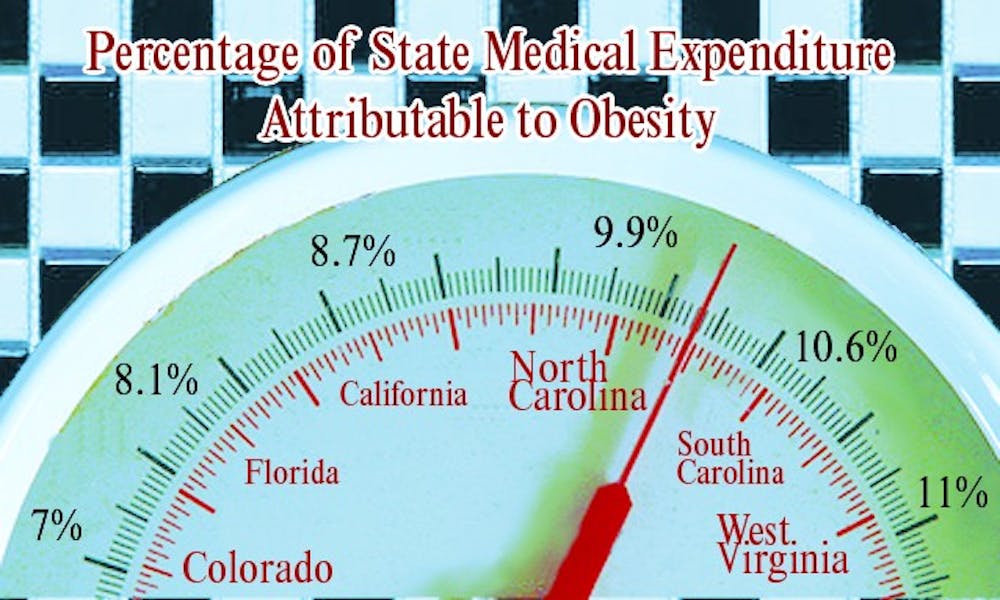Packing some extra pounds comes with a hefty cost.
According to a study conducted by researchers at think tank RTI International, Duke University and the Agency for Healthcare Research and Quality, health expenses related to obesity cost the state of North Carolina nearly $5 billion in 2009.
Obesity-attributable Medicaid and Medicare expenditures throughout the state were $807 million and about $1 billion, respectively. Medicaid supports those of low income and is governed by the state, and Medicare is a federal governed program for people 65 and over, or those permanently disabled.
The study found that North Carolina would save 9.9 percent on overall medical costs and 13.1 percent on Medicaid costs if all obese people in the state were at a normal weight.
Total expenditures in other states ranged from $203 million in Wyoming to $15.2 billion in California per year. Obesity-attributable Medicaid expenditures were the highest in New York at $4 billion and obesity-attributable Medicare expenditures were highest in California at $3.4 billion.
The figures confirm earlier findings that obesity accounts for a significant and preventable portion of the nation’s medical bill, according to an RTI press release Aug. 18.
The study was published in the online research journal Obesity. The study updates the state-by-state estimates of obesity-related medical expenditures originally reported in a 2004 study, but uses data from a 2006 survey of national and state medical expenditures to predict costs in 2009 dollars.
Researcher Joel Cohen, a co-author of the report, said that the public and private sectors definitely have an incentive to have healthier people, as is shown by this study.
“States are spending a lot [of money] in public programs in expenses for people who are obese,” Cohen said, “This certainly has an economic impact on business owners who are paying for health care of their workers.”
Obesity is a matter of national concern, said Dr. Howard Eisenson, executive director of the Duke Diet and Fitness Center.
“Obesity and inactivity are thought to be big contributors to the rising health costs in this country,” Eisenson said. “In addition to promoting better health and longevity, it’s costing more money to deal with inactivity.”
Obesity is considered the second leading cause of preventable deaths after smoking and tobacco use, he added.
“We usually talk about [the dangers of] obesity in conjunction with a sedentary lifestyle,” he said. “There are some experts who are expressing concern that if certain trends continue, this may be the first generation of young people with a life expectancy shorter than their parents.”
Obese people are most likely to suffer from a variety of ailments, including Type 2 diabetes, high blood pressure, abnormal cholesterol, sleep apnea and osteoarthritis, Eisenson noted. Research has also noted an association of obesity with uterine cancer in women, cancer of the esophagus and colon cancer.
The number of people diagnosed with these conditions has risen and is also starting to appear among young obese patients. Eisenson added that certain cancers may also become more common with an increasing percentage of obese people.
Despite wanting to fight obesity, the proper steps necessary to reverse the trend are unclear, said Frank Sloan, the J. AlexMcMahon professor in health policy at the Fuqua School of Business.
“Everyone sort of knows that being obese is bad for you. It’s more of a problem [of] keeping people motivated,” Sloan said. “Some people suggest putting a tax on food, but it could be highly regressive.”
Get The Chronicle straight to your inbox
Signup for our weekly newsletter. Cancel at any time.

